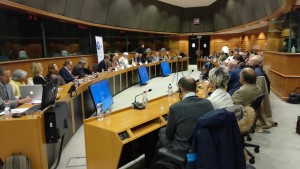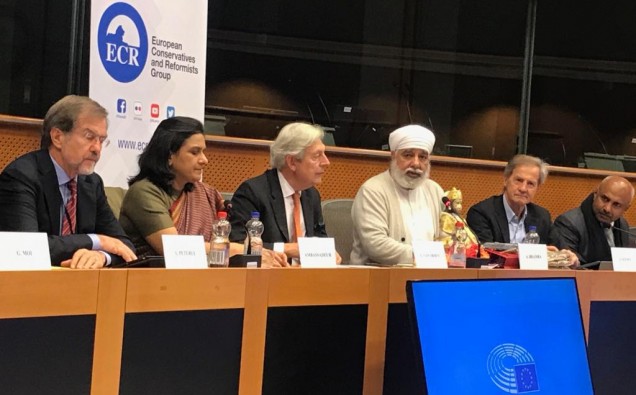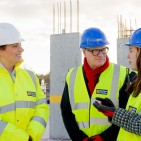Ayurveda Day was celebrated on 21st November 2018 for the first time in the
European Parliament, Brussels. The discussions and celebrations were hosted by
British Conservative MEP, Geoffrey VAN ORDEN MBE, Chairman of the European
Parliament’s Delegation for Relations with India and Her Excellency Ms Gaitri Issar
KUMAR Ambassador of India to the Belgium, Luxembourg and the EU and guided
by Amarjeet-singh BHAMRA, from the UK Parliament’s All Party Parliamentary
Group (APPG) on Indian Traditional Sciences. The Ayurveda Day has been
celebrated in the British Parliament regularly since the formation of the APPG Indian
Traditional Sciences.

As well as European Parliamentarians, some 60 delegates came from across
Europe, India, the USA and Peru, including many Distinguished Academics,
Ayurvedic Doctors, Integrative Clinicians, GP’s, Hospital Directors, Practitioners,
College Principals, Manufacturers, Traders as well as Leaders of Ayurvedic
Associations and World Health Organisation attended to share, update and plan the
political strategies, circumstances and progress of Preventive Healthcare Systems
from 17 countries.
Mr Alojz PETERLE MEP former Prime Minister of Slovenia, welcomed the first
celebration of Ayurveda in the European Parliament. He stressed that Traditional
Sciences are not less scientific than modern science and needs to be given its due
respect. The aim should be not to test the efficacy of Ayurveda but to offer patients
real choice. Patients are well informed and pluralism in medical modalities is
required. He suggested that in India, western medicine should be the Alternative or
complimentary modality and Ayurveda the mainstay.
Mr Peterle also shared a personal anecdote of a friend who was on the list for knee
surgery and benefitted from Ayurvedic treatment. This cheaper treatment prevented
this friend from undergoing costly knee surgery. He explained to the meeting the
main barrier to overcome regarding the progression of Ayurveda into mainstream
healthcare was the modern demand for “science” and “proof”. Mr Peterle explained
that ‘the modern world is very interested in an evidence base, however just because
the current evidence-based model cannot identify evidence, that does not mean the
evidence is not there’.
His words were well received. The modern definition of evidence seeks efficacy,
which is simple to assess for chemical interventions. In chemical testing, it is easy to
show that one chemical has an action on another chemical, and it is simple to adjust
the characteristics of a chemical to fit the intended action. However, in Ayurveda, the
model of working is not efficacious, but rather effective: a whole person, whole health
outcome based on multiple variables rather than the actions of one synthetic
chemical upon another.
Mr Peterle ended his talk with a reminder that it is not natural or traditional medicine
that is the alternative treatment, the alternative treatment is pharmaceutical.
V5©2018 APPG Indian Traditional Sciences | Ayurveda Day | European Parliament
Page2
Mr Jo LEINEN is a German politician and Member of the European Parliament from Germany. He is a member of the Social Democratic Party, part of the Party of European Socialists. He is well known for his environmental and foreign affairs activities, as well as for his support for a Federal Europe. He spoke expressively on Ayurveda as a preventative medicine, which keeps us healthy. With western health care systems focused on disease, a preventative system is welcome, said Mr Leinen during Ayurveda Day celebrations. Mr Leinen thanked and agreed to support the work of Amarjeet S. Bhamra of the APPG Indian Traditional Sciences and his international efforts to protect and promote the Ayurveda System of Medicine.
The host, Mr Van Orden said: “We have much to learn from Ayurveda as a way to prevent disease and to deal with chronic illnesses. I feel sure we would all benefit if Ayurveda was better understood and appreciated in the West. Among the challenges are the need for improved methods of verification of the benefits of Ayurveda and for proper certification and professional accreditation of practitioners.”
He agreed with Mr Peterle, and reiterated that all of the good outcomes of Ayurveda must be logged, recorded and presented to policymakers and the rest of the world. He explained that seeing the congregation of experts, academics, clinicians and politicians from all over the world is surely a great sign that developing a body of evidence is possible.
Mr Van Orden read a petition that will be launched shortly to gather one million strong signatures for the European Parliament to review and debate Ayurveda and Traditional Medicines.
Hon. Ms Gaitri Kumar – Indian Ambassador stressed the essential role that Ayurveda played in the lives of Indian citizens on a daily basis. From the kitchen to the medicine cupboard, Ayurveda was used daily.
She also reiterated the AYUSH commitment to poly medicines. Patients require choice and should not just be limited to western medicine.
The Indian Ambassador also said it was both fantastic and inspiring to see the congregation of such an amazing gathering all passionately speaking about what interests them the most. The event was about ancient science, but not science in the modern sense. She reiterated the issue of evidence, and suggested that perhaps there needs to be a renewed look at what evidence is: do we need to see the effect of Ayurveda in a Petri dish, or is the clear, discernible benefits of yoga to people suffering from arthritis good enough? She reminded the group of the importance of collecting evidence, and suggested that perhaps there should be a Chair appointed to co-ordinate activities and generate the research and evidence the Western World would like to see.
Prof. Madan THANGAVELU, stated that this well attended event was a show of strength for the Ayurvedic cause. On behalf of the APPG Indian Traditional Sciences, he made a presentation of a joint statement between EU and India regarding moving Indian Traditional Sciences forward.
V5©2018 APPG Indian Traditional Sciences | Ayurveda Day | European Parliament
Page3
Prof. Tony NADER, the head of the worldwide Maharishi Organisation via Skype offered similar direction to Mr Leinen and stressed that Ayurveda was preventative and personalised medicine. Peoples physiology differed and Ayurveda addressed this issue. Because Ayurvedic techniques are so simple and easily assimilated in to everyday live – it is considered kitchen medicine. But Ayurveda played another role – it looks into human consciousness and awareness. Our experience of life is based on our awareness and consciousness. But other systems of healthcare do not acknowledge this aspect of the human. When you develop consciousness, physiology improves. Ayurveda is the best system of medicine to make life on earth happier.
Dr Geeta PILLAI from the World Health Organisation’s Traditional Medicines Committee, reiterated the message of the importance of Traditional Medicinal Systems. Getting regulation right is essential, he said, as if the regulatory structure is not right, then we may inadvertently harm or restrict the practice of Ayurveda, rather than help or promote it. All the work that has been done by WHO is geared towards promoting an essential preventive healthcare method. The WHO does not distinguish between traditional and complimentary medicine. They are looking for what works. The WHO is focused on patient centred medicine.
Prof. Dr. Venkata JOSHI, principal lecturer at the College of Ayurveda UK speaking on the theme of this gathering, Ayurveda for Public health, said, Ayurveda is steeped in individualised medicine and brings stability to the being. He discussed physiology from an Ayurvedic perspective stressing how this system addressed all aspects of the human being – from physiology to psychology.
Ms. Ragasudha VINJAMURI, a renowned Bharatnatyam dancer explained the legendary cultural dance origin of Lord Dhanvantari (father of Ayurveda) through her dance movement.
Esteemed Delegates in all their imposing ways shared the fundamental prescription of choice of freedom in order to achieve our goals. We would like to grow and ensure that the Ayurveda professionals are recognized as equal to other registered medical professionals in the European Union. We see a bright future for Ayurveda in Europe and will contribute our best efforts to ensure that Ayurveda becomes fully integrated in European Health System. Therefore, we welcome and salute this brave new initiative launched by the UK All Party Parliamentary Group Indian Traditional Sciences to unite Ayurveda fraternity from all over Europe and the rest of the world and give them voice in the European Parliament. Speakers as well as participants included:
Juliette INVERDALE, Rajinder K SINGH, Brittany SPENCE, Elizabeth GIBBENS, Dr Walter MOELK, Deniz GULER HILHORST, Elisabeth DE WACHTER, Minakoemarie MANGRE, Dr Avtar SINGH, Gordon BRENNAN, Khushboo MEHTA, Leyla MOUDDEN, Dr Mauroof ATHIQUE, Dr Nitasha BULDEO, Carla VAN DIJK,
Cornelis PETERS, Tamara SLIJEPCEVIC, Gayatri PURANIK, Gudrun BUCHZIK.
To find out more info about European countries, you can visit https://www.schengenvisainfo.com/eu-countries/ for an all-inclusive guide.

















